“Dark Page”
Written by Hilary J. Bader
Directed by Les Landau
Season 7, Episode 7
Production episode 40276-259
Original air date: November 1, 1993
Stardate: 47254.1
Captain’s Log: The Enterprise is hosting a delegation of Cairn, a telepathic species that never developed speech. They are being trained in how to speak verbally by Lwaxana Troi. Her star pupil is a girl named Hedril (who gets to compare enhancement devices with La Forge; she has a vocal enhancer, he has a VISOR). At one point, looking at Hedril causes Lwaxana distress, but she fobs it off as being tired.
When Troi arrives, Lwaxana immediately introduces her to Maques, with whom she is trying to set her daughter up. (Maques’s wife, Hedril’s mother, has died.) The next morning, the inevitable argument between mother and daughter over the former’s endless attempts to matchmake the latter modulates into concern as Lwaxana once again looks distressed. But once again, she fobs it off.
Maques apologizes to Troi for being forward. He also tells Troi that he discovered, when he communicated telepathically with Lwaxana, that she had a dark part of her mind, a piece that was hidden. Lwaxana called it privacy, and Troi explains to Maques that many species are not as open as the Cairn.
Later, Troi and Riker talk in Ten-Forward. Troi’s worried about her mother—she’s even dressing in a subdued manner. Riker doesn’t think it’s that big a deal, right up until Lwaxana storms into the bar and yells at Riker to get away from her, that it’s all his fault, if he had done the right thing years ago, she’d be married by now.
Troi immediately takes Lwaxana to sickbay. Her psilosynnine levels are low, so Crusher tells her to avoid telepathy for a while. Troi gives the Cairn a tour of the arboretum. Lwaxana is tagging along, and she looks like hammered crap. While Troi shows Maques and two others the flowers, Hedril starts walking around the perimeter of the pond.
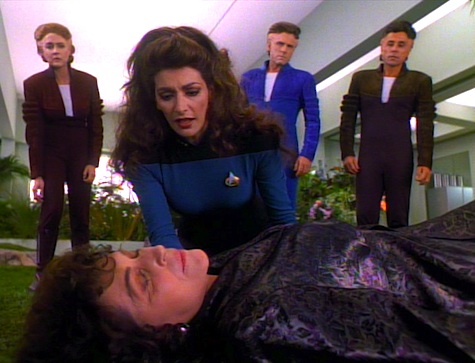
She loses her balance and falls in, recovering immediately, but then Lwaxana collapses. Troi rushes her to sickbay; she’s lapsed into a coma, and there’s no way to bring her out. Picard and Troi talk to Maques, to see if this might be a side effect of Cairn telepathy. Maques tries to explain again about the dark part of her mind, but he can’t do it well with words—finally he speaks telepathically to Troi, who’s momentarily overwhelmed. Eventually, Troi parses through the images Maques provided her: something is affecting Lwaxana’s metaconsciousness, a part of the Betazoid psyche that helps protect them from psychic trauma.
Maques tries to contact Lwaxana telepathically, but all he sees is images that are meaningless to him. He suggests using himself as a telepathic bridge so that Troi can contact her and bring her out of it.
Troi finds herself in a darkened Enterprise corridor. Lwaxana’s voice can be heard in the distance, asking for help. Troi also hears the sound of water.
Picard appears, ordering Troi to sever the connection—but that’s something Maques can do, there’s no reason for Picard to be interpolated into this image. Picard then speaks with Lwaxana’s voice, asking to be left alone. Troi is then chased through corridors by a wolf.
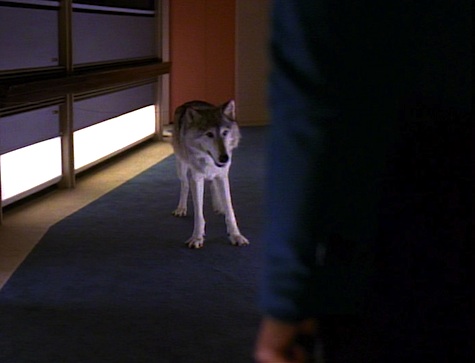
Entering a door, Troi finds herself in a house on Betazed and is confronted by her father, wearing an older Starfleet uniform. He apologizes for going away when she was so young, and sings “Down in the Valley” to her—but Troi recognizes it as a stall and reluctantly leaves her father behind.
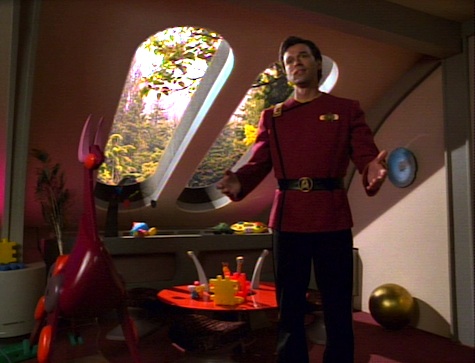
Reentering the corridor, Troi sees Hedril—but without the exposed flesh that all Cairn have at their temples, and with the darkened eyes of a Betazoid. Lwaxana then angrily tells Troi to go away, and she wakes up unexpectedly.
Troi talks to Hedril, who says that she makes Lwaxana sad. Troi goes through her mother’s things, reads her journals for the past five years, talks to Mr. Homn and all her friends on Betazed, and the only bad thing that seems to have happened to her is Troi’s perpetual not-married state. Picard suggests going back further than five years, and they sit down to start at the beginning of her journal, shortly before she and Ian Troi got married.
To their surprise, there’s a seven-year gap starting about a year after Lwaxana and Ian married, and ending when Troi was about a year old. There were journal entries, but her mother deleted them thirty years ago.
This just increases Troi’s determination to go back into Lwaxana’s mind. She sees Hedril-as-Betazoid again, with the wolf. When Troi calls out to her, she asks, “Who’s Hedril?” Turning a corner, she sees a door open to space, and hears Lwaxana calling for help. Troi jumps through into space—
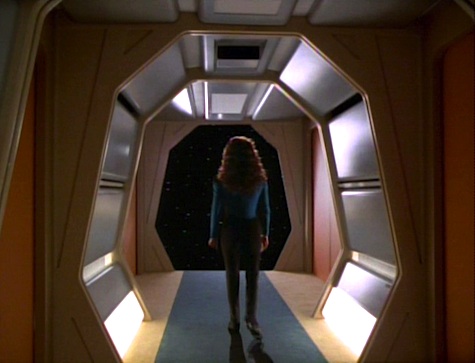
—and winds up in the arboretum. Lwaxana is there, now asking her to go away. Troi gets Lwaxana to finally open up. She sees a picnic: Ian and Lwaxana, an infant Troi, and Hedril-as-Betazoid playing with a dog. Lwaxana calls the girl Kestra, and Troi realizes to her shock that that’s her older sister, who proceeds to accidentally drown chasing after the dog. The trauma of losing her oldest daughter is so great that Lwaxana deletes her journals, erases all traces of Kestra, completely represses any memory of her to avoid the trauma of facing that she let her child die.
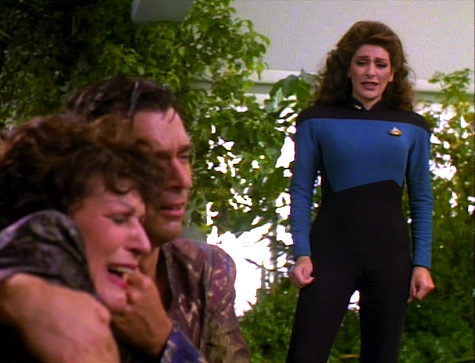
Troi forces her mother to confront her daughter, and Kestra appears, this time not looking at all like Hedril, and Lwaxana apologizes and hugs her. Kestra fades away and Lwaxana finally wakes up.
Mr. Homn saved one picture of Kestra in case Lwaxana ever decided to remember her again, and Troi then asks her mother to tell her about her sister.
Can’t We Just Reverse the Polarity?: Psylosynnine is a neurotransmitter connected to telepathy. Overuse of telepathy can deplete it.
Thank You, Counselor Obvious: Troi has a weird-ass reunion with her dead father, finds out she had a sister all these years and didn’t know it, and finally finds out why her mother is such an overprotective bitch.
If I Only Had a Brain…: Data is able to contribute to the speculation regarding what happened to Lwaxana thanks to his own recent experiences with dreams (as recent as last episode…).
There is no Honor in Being Pummeled: Lwaxana once again refers to the Klingon security chief as “Mr. Woof,” and Michael Dorn beautifully plays it, starting to open his mouth to correct her, thinking better of it, and then just shaking his head ruefully.
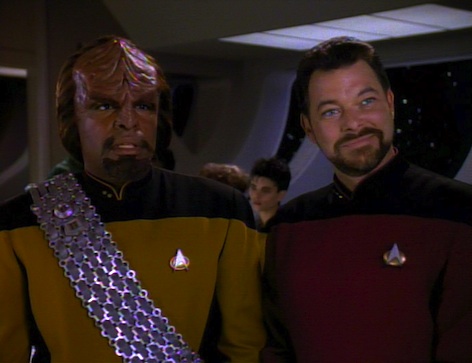
I Believe I Said That: “If two Cairn were having this conversation, it would have been over minutes ago.”
“Really?!”
Lwaxana describing Cairn telepathy, and Picard wishing that it were so.
Welcome Aboard: Majel Barrett makes her final appearance on TNG as Lwaxana—she’ll appear twice more on Deep Space Nine in “Fascination” and “The Muse.” (Carel Struycken was unavailable to reprise Mr. Homn, and this is the only TNG episode in which the two characters don’t appear together.) Norman Large, having played Proconsul Neral in “Unification” and “Unification II” and a Kobheerian in “Duet” on DS9, returns as Maques; he’ll be back as an Ocampa on Voyager’s “Cold Fire,” and a makeup photo of him from “Unification” will be used as a wanted poster in Odo’s office throughout DS9’s run.
But this episode’s Robert Knepper moment is the very young Kirsten Dunst, a year prior to her career-making turn in Interview with the Vampire (and nine years prior to her role as Mary Jane Watson in Spider-Man), as Hedril and the image of Kestra.
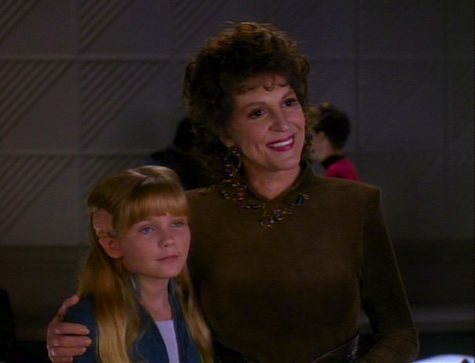
Trivial Matters: This is the first sighting of Troi’s father, who was first mentioned way back in “Encounter at Farpoint,” and who was named in “The Child.” Your humble rewatcher made him a primary character in the novel The Art of the Impossible, which also dramatized his death on Raknal V, and which made use of much of the backstory established in this episode.
Troi says at the end that Mr. Homn had kept the picture of Kestra all this time in case Lwaxana decided to remember her. However, “Haven” established that Homn was a new hire. Your humble rewatcher covered this in the short story “The Ceremony of Innocence is Drowned” in Tales of the Dominion War, which established that Lwaxana had discovered that Xelo had been hoarding some keepsakes of Kestra. Lwaxana discovered this and grew furious, firing him and destroying those keepsakes, then making up the story about how he thought lewd thoughts at her that she told in “Haven.” Xelo passed on the one picture he was able to save to Homn, which he provides at the end of this episode.
In one of the alternate timelines seen in your humble rewatcher’s Q & A, a grown-up Hedril took over the role of ship’s counselor from Troi after she left to serve on Titan following Star Trek Nemesis.
Finally, just so there’s one note that doesn’t connect to me: Though Bader got sole credit, the script was rewritten by Rene Echevarria for production, and it apparently went through many different central characters before settling on Troi’s mom.
Make it So: “Your brain isn’t sophisticated enough.” It’s an impressive feat to take a character in serial fiction that everyone is familiar with and come up with a surprise revelation that retroactively illuminates their character and explains so much about them. Chris Claremont pulled this off in Uncanny X-Men #161, a comic book published in 1982, some twenty years after the X-Men debuted, revealing that Professor X and Magneto were once close friends before they were separated by philosophical differences. This has become so ingrained in the X-Men mythos—heck, they built an entire movie around it—that people forget that it wasn’t part of the original conception of the characters.
TNG pulled off a similar trick here. (The franchise would do it again on DS9 with the revelation in “Dr. Bashir, I Presume?” that the title character was genetically enhanced.) So much of Lwaxana’s character is pulled into focus here, particularly her almost fanatical overprotectiveness of her daughter. And Barrett is brilliant, never losing Lwaxana’s trademark lunacy, but utterly convincing you of the tremendous pain she’s hiding. Her anguish, her sadness, her fear, they’re all heartbreakingly real. And the moment when mother and daughter wake up in sickbay and are holding hands is just a warm, wonderful bit.
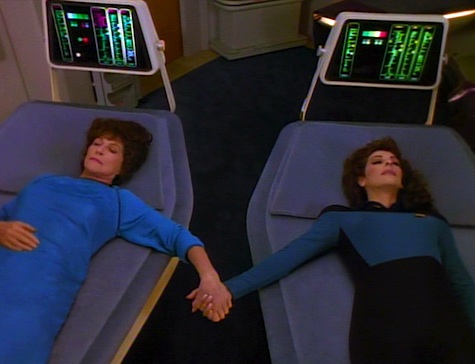
Les Landau’s direction mostly serves the episode well, using the simple expedient of changed lighting for Lwaxana’s dreamscape (a trick Sir Patrick Stewart could’ve used for Data’s dreams in “Phantasms” the previous week), and not overplaying anything. In particular, he does a good job with Norman Large’s Maques, convincing us of a person who is unused to language without slowing the story down—that sort of stumbling speech pattern can grind an episode to a halt, but Landau and Large pull it off nicely. It almost makes up for the silly intense stare that Large does every time he communicates telepathically.
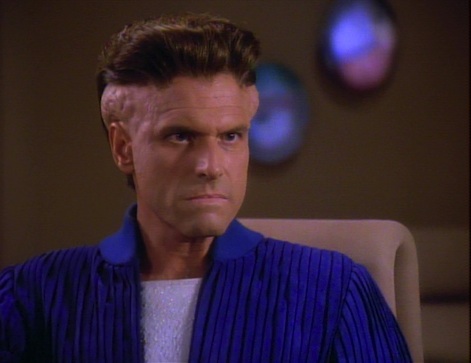
Warp factor rating: 6
Keith R.A. DeCandido sure has written a lot of stuff about the Troi family, hasn’t he?










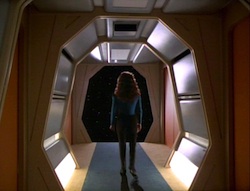
Watching this now, I find some of what has become stereotypical “exploring a person’s mind” imagery a little hokey and tiresome, but when I first saw this, I was really into. This episode really intrigued me and kept me watching the show. For the record, I do still like the other parts of this episode.
Although introducing a hitherto-unknown secret sibling for a long-established regular could’ve been one hell of a contrivance, Hilary Bader (and Echevarria) made it work quite effectively here, or at least put in enough good stuff that the contrivance is forgivable. And it’s not surprising that after “Half a Life,” when Majel Barrett showed what a hell of a fine actress she could be, the writers continued taking Lwaxana in more dramatic directions.
Still, it suffers from the standard episodic-TV syndrome of redressing the standard sets to look like a dream environment, much like DS9’s “Extreme Measures” a few years later. It would’ve been a stronger episode if they’d had the budget to do location work for the dream sequences.
Also the episode creates a continuity hitch. “Haven” said that Deanna got her accent from her father, but here he was played by a man with an ordinary American accent. So where did Deanna’s accent come from?
I love the depth this gave to Lwaxana’s character. I also love that she wasn’t depicted as a villain in any way, but as a grievously wounded, ultimately loving person who just… broke. I love that Deanna didn’t blame her or judge her.
I haven’t lost a child. I hope not to. I don’t know how I’d get through it. I’m pretty sure I wouldn’t turn out like Lwaxana, but I would definitely be changed.
I especially love that the show implicitly asks us to reevaluate Lwaxana and her behavior, and perhaps, to be a bit kinder in judging her. Would that we could do that on a regular basis for those around us. Nearly everyone has pains, sometimes great ones, that no one else can actually see or understand.
This episode was so painful for me to watch. I’m not sure if I am glad it was semi spoiled for me or not (I knew it was about something bad in Lwaxana’s past and that Troi had a sibling, but I had it in my head that it was a miscarriage). If it hadn’t been, I think I would have been even more sucker punched than I already was – which would have certainly made it a more powerful episode but I don’t know if I could have handled that. We watched this one over Thanksgiving and usually our Star Trek time is a time to kind of decompress…especially a Lwaxana episode. I was pregnant at the time too (and I have an almost-two year old already). So to watch this was horribly painful for me.
It’s hard for me to judge it objectively – it definitely did it’s job in eliciting an emotional response (at least for me) and it unsettled me for days. Maybe it was just being emotionally manipulative (dead child plot!) and I fell for it, or maybe it really did a good job (I do think it had some really positive aspects to it) But I’m not sure I would ever rewatch it.
I do think it shows the potential Lwaxana had as a character – some of my very favorite episodes were Lwaxana episodes (Half a Life stands out, and I actually enjoyed the one with her and Alexander even if the holodeck setting was really weird), and some of my LEAST favorite episodes were Lwaxana episodes. There are times she just came off as simply annoying and silly, and times she came off as a free spirit and vivacious and had some depth to her. I never saw her as an ‘overprotective bitch’ though. Really not a bitch at all – to me a bitch is somebody who is malicious, whereas she (at her worst) just stuck me as somebody who was a bit self absorbed and oblivious and just kind of ran over other people, but not out of spite or malice. Probably not somebody I’d want to spend a lot of time with in real life, or maybe only in small doses.
I am not even sure how I could handle something like this – I don’t think I could ever, ever get over it, especially if it was something I perceived as my fault or was preventable. I live in fear of that every day, really. I don’t even think the resolution in the episode would have helped me (similar to Geordi’s resolution of his own arc in Interface) because it wouldn’t erase the fact that a child I was supposed to protect died under my care, and their last moments were full of terror and pain. This is not to say we should judge her overly harshly (truly, I felt a lot of compassion for her), but I know I would judge myself that way and never truly get over it, at least not completely. Maybe her character doesn’t really either, but can still move on. I don’t even know how I would manage that though.
@2 – on a totally ligher note, I thought that too!!!
I have never liked this episode probably because of Barrett’s acting kind of reminds me of Sally Field’s acting in Steel Magnolias but I can’t blame Mrs. Gene Roddenberry for trying again.
I thought Barrett’s acting was incredibly wooden in this, which surprised me because I’ve seen her act so wonderfully in other episodes. I was also put off by the fact that when Troi contacts all her mother’s friends and Mr Homm about a past tragedy that could be KILLING her, none see fit to mention the death of a daughter that practically destroyed her. That’s seemed to be a big hole in the plot. Yes, some might think Troi knew, and some might take the notion of privacy that far, but not all.
I have to go in the other direction. Emotionally manipulative? Yeah, I’ll give you that, but it was still no less effective on me – this is in my top 10 favorite TNG episodes on Barrett’s acting alone.
I don’t see the explanations as contrivances – in fact, I consider it more than plausible that telepathic beings have many safeguards and abilities when it comes to dealing with psychic trauma – while by our standards it might not be rational, I don’t think we would have the capacity to understand what such events might do to minds like theirs.
This was a great send-off (in TNG, we’ll see her later in DS9 of course) for a great character…
shellywb: I have no trouble with that, because it was more than three decades ago. It didn’t come up in conversation, because Troi was focused on some kind of recent trauma that might have been triggered her mother. It wasn’t until they’d exhausted all the recent possibilities hat Troi even looked back that far.
—Keith R.A. DeCandido
Now we know why Mitt Romney had such a hard time connecting with voters – he was used to communicating telepathically with a flood of images.
And yeah, I agree with the others the darkened sets for dreams has become a cliche by this point. I liked the character reveal, but found drowned child too depressing to be enjoyable.
This episode wasn’t originally shown in Scotland (I don’t know if it has been subsequently) as it came too soon after a group of schoolchildren were massacred in the small Scottish town of Dunblane. It was obviously felt to be too close to the bone.
I enjoyed the episode, but it did not prompt me to have any sort of reevaluation of Lwaxana or feel more charitable towards her obnoxious behavior in other episodes. The things is, looking back, none of Lwaxana’s actions strike me as being “overprotective” of Deanna. She doesn’t seem like she’s trying to mess with Deanna’s life because she’s worried her daughter might be in danger but more because meddling with every detail in Deanna’s life and everyone else’s is what she does. An overprotective mother reminds you to wear a sweater because it’s cold out; a meddling mother insists that you wear the red sweater than the blue one and picks out the socks you should wear with it. Lwaxana always struck me as more the latter than the former.
Again, it was a good episode. It was nice to see Ambassador Troi actually being a pretty skilled diplomat, and I sympathized with both mother and daughter during the whole thing. I just didn’t find it the earthshattering revelation other people seemed to.
I watched this episode recently. My feelings echo most of what has been said already – Barrett’s acting was superb, IMO. Troi discovering she has a sister that nobody mentioned to her in 30 years is a bit cliche and hard to swallow (I’ll buy that Lwaxanna didn’t talk about it, but nobody in the extended family ever mentioned it?), but all things considered it was handled a lot better than it could have been.
On rewatch, I was reminded of two things that stand out to me whenever I watch this episode. First of all, I like the way Norman Large plays Maques. He is someone who has been transported from his own culture into another and he is really struggling to adjust, so while he’s genuine in his actions he comes off as rude or creepy at times because he isn’t familiar with social norms outside of his own culture. He appears in Troi’s room uninvited, is very blunt when speaking, and has difficulty explaining himself in the local way, which makes the viewer wonder about his intentions at first. But in reality it’s because he is simply unfamiliar with social protocol, and doing what would be normal for him coming from a culture where there are no secrets, no need to explain yourself because everyone is already aware of what you are thinking and doing. Anyone who has found themselves in the midst of another culture that is so foreign to their own and has to stumble along to learn the basic dos and don’ts can relate.
Secondly, I thought it obvious that the angry noises from the wolf were done in post-production, and it looks like they had to work hard to get it to act agressive. I imagine it was a very good-natured animal off camera.
@9, I would agree except that she found that very obvious gap in the diary. Isn’t the first thing you’d do is call home and start asking why?
I’m the first person to admit things easily remain hidden in a family. This weekend I found out that I’d had an uncle who’d died at the age of 6 on the operating table, 80 years ago. But if I’d had my grandmother’s diary from that time and she’d skipped 6 years, I’d have asked questions, especially if she showed evidence of trauma.
I’m watching through these episodes as Keith reviews these, so I watched it for the first time on Monday. It was pretty difficult for me having had my 2yo son drown 3 years ago. It made some parts of the episode seem really trite, particularly how a few words from Deanna makes everything ok, despite the issue eating away at her for 30 years and practically killing her. I suppose when you only have 45mins an episode there’s not much you can do about that. But I think my experience made the response of Lwaxana of hiding it more believable. How do you tell your daughter that her crying as a baby is what distracted you whilst your daughter drowned?
I thought considering the constraints they did a reasonable job with a difficult subject
@15 – I am so sorry to hear about that. :( I can only imagine how awful that must have been and how hard this episode must have been – I’ve only encountered this kind of thing in my nightmares and overactive imagination and I still found the episode rather triggering. I hope you have been able to find some peace and healing.
Very well done but extremely difficult and upsetting to watch. I couldn’t go through it again.
I’ve always liked this one, but then again, I’ve always liked all the Ms. Troi episodes. I love the play on the name of the “race of the week:” Cairn – a heap of stones piled up as a memorial.
Wow… this is the first episode in the entire rewatch that I really didn’t remember. And yet, somehow I think I did see it when it originally aired… the bit where Deanna says “even her clothes are subdued” was definitely familiar. And as soon as the little girl fell in the water, I knew “Deanna had a sister that died”, though I couldn’t remember the details.
For whatever reason, this one really didn’t stick in my brain the way others did. Most of season 7 are episodes I only saw the first time around and have, for whatever reason, never caught again in reruns. But I remembered Picard being the pirate Galen, and I remembered the cellular peptide cake and the mouths, and I remember warp drive tearing spacetime apart, and I remember Crusher and Picard being telepathically linked, and I remember Data’s mother, and I remember the terrible de-evolution, and I remember All Good Things — each one, I’m sure, I only saw once, but I remember them. But this one was nearly completely blank for me.
Maybe I blocked it out the way that Lwaxana blocked her memories… because by the end of watching it I was an emotional wreck! As cliche as all of it was, it got me. Maybe because I’m a parent now, it really affected me. Mrs Roddenberry was heartwrenchingly believable. And also, even before we got to the dead-child bit, I was terrifically moved by the scene of Deanna meeting with her father. It was so sweet and beautiful and sad. Hit me right there, as Q would say…
And I recognized Kirsten Dunst in her last scene… heh… very cute!
I really enjoyed this episode, but the whole plot begs the question – how could a telepathic mother not know that her child was in trouble?
I’m just guessing, but I think most of the people who did not “get” this episode probably don’t have kids. I was cavalier about parenthood – until I became a parent. I’m a middleaged guy, yet I was holding back tears at the crucial revelatory scene at the end of this episode. I thought it was handled well, especially through the eyes of the characters we have come to know. This was more of a Lifetime Channel episode than science fiction, but I still thought it was an entertaining hour of television. And I agree with krad in the sense that it was quite an accomplishment for the screenplay writer to create this backstory for Troi’s mother that fits so seamlessly into the personality of this character and her relationship with her mother. And I would respectfully disagree with #12’s quibble about Lwaxana having been a “meddling” mom instead of an “overprotective” one. Overprotectiveness can manifest itself in many ways. Perhaps being a meddling mom was her conscious or subconscious way of trying to let Deanna find her own way without giving in to overt overprotectiveness. I thought this was handled with just the right blend of drama vs. subtlety.
Finally, it’s interesting to see how even way back then you could spot Kirsten Dunsts’ talent. When she fell into the water and looked up with that sheepish but dazzling smile, you can see a star in there….
I do not have kids, but this episode resonated very strongly with me. Part of it may have to do with my own writing. I seem to get a lot of mileage (as our humble re-watcher would put it) out of the themes explored here, such as childhood memories, loss, and how to get on with your life. Just wanted to say that Majel Barrett was brilliant, as was Marina Sirtis.
On a different note – is it me or does anyone else has this strong urge to explore the Enterprise at night? And considerung the size of the ship, the arboretum section must be huge. Like a real park.
And lastly, the music by Jay Chattaway is very good, I noticed it in this episode particularly, but may have been rather unobservant in the past, for that matter. Those switches between present and dreamscape … along with the lighting, it really works. I mean, it´s TV, but it works.
I have kids, and I usually like Lwaxana Troi episodes, but I didn’t like this one. I found it clichéd and contrived. Why does there have to be a dark secret or a long-lost sibling in everybody’s past? It’s such a waste – the Cairn were interesting, Lwaxana acting as a language teacher and diplomat was cool, and the close bond between them was sweet. I would have liked a story about her time among them much more than the story we actually got.
*TW: death, sexual assault*
Why I feel compelled to comment again on this rewatch despite it so many years later, I’ll never know but…
As someone who got the reveal last year that one of her dad’s sisters, whom I had been told had died of suicide, was most probably raped and murdered instead (perpetrator never caught, too, but apparently it might have been a serial killer), and that this horrible fact has been kept mostly hidden from my dad, the youngest sibling, for 40+ years (and totally hidden from my mom and us)… I guess I mean to say you can never know. Writing this makes it sound so extraordinary (and cliché some of you might say if my dad’s story was Deanna’s), but yeah… lots of painful stuff can be kept hush. For a long time. By an entire family of 5 older siblings + parents in my dad’s case.
Familial relations had always been less easy, less effusive, more secretive/awkward in my dad’s side of the family compared to the warm close-knitedness of my mom’s, which I always chalked up to a difference in temperaments and generation… and while there is that (after all, the way the family handled the tragedy is certainly the reflection of it’s dynamics), I now reevaluate a lot about my aunts and uncles of it in light of the collective trauma they’ve been through, and keeping inside for so long.
And I have found over the years that many, many people have such tragedies (if less outlandish-sounding) that do not get talked about, but that quietly inform their lives… miscarriages, sexual assaults, illnesses. Especially in some populations, like every queer person of a certain age having lost a ton of friends to AIDS or First Nations people probably all knowing one or several missing or murdered women, along with having lost many to suicide. Not mentionning the amount of sexual assault that doesn’t get reported.
What is an outlandish drama backstory in the opinion of some is probably another’s reality, that just doesn’t get talked about because it’s too painful and so they try (and sometimes succeed) to let lie in the past and carry on.
So I guess… there are many things you can critique about such drama being added to a tv character backstory, but maybe don’t be too prone to scoff at it being unbelievable? Or at least, try to be tactful – you never know what the person reading you might have been through.
@24 – Great comment.
I’d seen this episode before, but for some reason this time it had a much greater emotional impact on me. It actually made me tear up and cry a bit.
I don’t have any children myself, and I don’t plan on ever having children (I just don’t have the proper temperament to be a parent), but I do have a very close relationship with my own mother. My parents tried to have a baby for six years before I was born, and I’m pretty sure that if anything ever happened to me or my younger brother, my mom would be a basket case for the rest of her life.
I don’t necessarily find it hard to believe that a tragedy like the Troi family’s loss of a daughter could remain hidden for years. I feel like a lot of families just don’t talk about that kind of thing. For example, my mother has five brothers, but when I was a teenager my mom told me in confidence that my grandmother once had a miscarriage, so there was actually a sixth brother that no one ever spoke about. I don’t remember my grandmother ever mentioning it. My grandmother also never spoke about her own childhood, which I understand was very difficult, because her mother was Bipolar at a time when the disorder wasn’t properly understood and there wasn’t any real treatment for such a condition.
These are things that were never discussed among the family at large, and I wouldn’t even know about them if my mother hadn’t told me about it in private conversation.
I just recently saw a Marina Sirtis panel video where she mentioned, that she had EXACTLY the same question that CLB had for #2. And she poked her head into Rick Berman’s office, and he snapped “SHE WENT TO BOARDING SCHOOL, OKAY?” I can’t remember if she had to remind him of what he’d said years before, or if he just anticipated the question, but still….
Maques was great; creepy and sincere in perfect balance.
I appreciate the idea of the episode a lot. It lost me on triteness of execution.
I think it would have been more effective
(a) without the wolf, especially such a sweet cute wolf … I get the idea, but just cut it, or overlay some CGI… it didn’t work.
(b) without the terrible “Come here / Help me / Go away” line readings… again, I get what it is supposed to be, but … like in songwriting, you can gain general power from specificity. “Look at me, I want to see your face, Deanna / Pass me the berries, please / Go to your room, mind your own business!” just as examples.
(c) Instead of crying expressively all along in dreamland, Lwaxana could have been in rigid denial in her mind, in the dark. Thus the “dark” motif, and the unhealthy repression represented. When she broke down and finally cried it out, the lights could have begun to come back on. Instead, we got her stuck and crying, without an arc.
(d) In fact, a very Star Trek way to evoke repression in dreamland could have been that anything meaningful or ‘real’ could have literally vanished. L sits on a chair, the chair becomes invisible. L nervously plays with one of her rings, the ring vanishes, her hands wave around nervously. Troi hands her the berries. They disappear subtly while the characters talk, until the dish is empty except for the red juice, and then the dish becomes heavy and Troi has to drop it and it shatters, making a crashing/splashing sound. (These are just ideas…)
(e) lastly, when the daughter comes back, I wish she had had more of a character, and not an alien esque “I have to go now”… seen it. And why would she “go” anyway, she just got here, escaping the repressed memory dark zone! Here’s mine:
“Mommy, this is a happy place! Listen, the trees are happy. This one’s Jill! Say hi Jill!”
“Kestra, I … need to tell you…”
“Mommy, lunch was yummy, the berries were so good! I love you!”
“Kestra, I … I’m so sorry… I wasn’t watching you!”
(crying) “No mommy, I’m sorry! I’m sorry I’m sorry, I was bad, I fell, I shouldn’t have been playing there, I’m so sorry!”
“Oh baby, that’s okay! You didn’t know! I’m the mother…”
“I forgive you, mommy! Do you… can you forgive me?”
“Of course! Little one! Of course!”
And then L could have held Kestra’s hand, and then suddenly awoke to find she was holding Troi’s. Because the mother-daughter connection is alive and well there, and because in a psychic realm sort of way, they could literally be holding a piece of Kestra’s mind-spirit-thingy between them, in a literalized sci-fi way.
today’s near-psychic search minimalism: rewtch drk pg
@28/jofesh: “overlay some CGI…”
In 1993? Not a chance. It had only been a few months since Jurassic Park achieved photorealistic CGI animals for the first time, and that was on a feature film budget and limited only to the shots that couldn’t be done with animatronic puppets. Star Trek wouldn’t even begin doing starships in CGI for several more years yet, let alone living beings.
@29 ~ Hmm! I was curious so I checked:
https://en.wikipedia.org/wiki/Timeline_of_computer_animation_in_film_and_television#1990s
The thing I was imagining (a glow, a sparkle, some kind of thing that distracts from the friendliness) seems possible, if Babylon 5 was primarily CGI that year.
@30/jofesh: Good grief, you hardly need computer graphics to animate some simple sparkles or glowing. TNG would’ve done that with hand-drawn video animation or some other basic video effect.
Seriously, it’s annoying how quickly 21st-century people have forgotten that computer graphics are not the one and only way to create visual effects. VFX artists did many, many great things before computers got involved. Even Babylon 5 probably would’ve used conventional video effects for something that simple; their CGI was for replacing miniature composite shots, matte paintings, and the like. (The NewTek Video Toaster system that was used for B5’s computer animation was also a broader video editing suite that combined existing image processing and editing techniques into an inexpensive package affordable for amateurs and hobbyists, but also allowed professional TV production and CG animation to become much more cost-efficient.)
Although I must have watched this episode at least two times before todays rewatch, I’ve had almost no memory of it. I guess I supressed the memory because for me this is probably the most boring episode of STNG. I can see why parents may find the story touching, but I don’t have kids. And since I couldn’t care less about the character of Lwaxana Troi and her traumas, the only mildly interesting part of the story was the concept of people communicating solely telepathically. Unfortunately, this concept was not really explored. As a result I had a hard time not to use the fast forward on my remote.
Interesting. I don’t have kids either, but I think this is a great episode. It is dark, disturbing, and revealing. I freely admit sometimes I can watch it and sometimes I can’t, for all those qualities.
I can see why Lwaxana irritates some people, but, honestly, shouldn’t some characters be irritating? If everyone is pleasant, that would be boring.
With all of the alien communication stuff, I just kept thinking, don’t they have writing? Lwaxana had telepathy, but she still kept a journal. They would have had to make up some words to write stuff down. How do you have a space-faring civilization that never tried to store information?
The real plot of the episode felt emotionally manipulative. They also never explained how the presence of these aliens caused Lwaxana to go into the coma. Did she just have to be around a seven-year-old girl and then see her fall into some water? Did the telepathy matter at all?
34. GeordisWingman
With all of the alien communication stuff, I just kept thinking, don’t they have writing? Lwaxana had telepathy, but she still kept a journal. They would have had to make up some words to write stuff down. How do you have a space-faring civilization that never tried to store information?
Just because they likely developed a system of writing does not imply they have a spoken language. All writing is is a sequence of syllables that represent concepts. In some Earth languages, like English, Russian and so forth, individual symbols also represent sounds which, combined, form spoken words for those concepts.
But in other languages, like Chinese, the symbols don’t represent sounds, only concepts. It isn’t at difficult to imagine that the Cairn have a written language. I can imagine that it would be very different from human concepts of a written language since it is representing thoughts not filtered through our type of symbology; but still a way to store information.
@35 If they have writing, the universal translator can help. They wouldn’t need another telepath to communicate. They could do their diplomacy in writing. Even without the magical translator, they would have been able to interact with other civilizations the old-fashioned way, just in writing. I wonder how they even got far enough to ask to join the federation without being able to communicate.
If they were at least shown with a book, mentioned reading, did charades, used pictures, or tried anything else, I would have accepted a plot around them just polishing up their speaking skills before the big meeting. These people on the show are supposed to be expert problem-solvers, and watching them sit in a room and come up with no alternatives to speaking is absurd. Instead they just struggle to chat and then go straight back to the apparently deadly telepathy.
They sure got a lot of use out of the fisheye lens and the hallway sets over the last two episodes.
I see some comments criticizing the episode for being emotionally manipulative. Honestly, I wouldn’t watch a show that didn’t try to manipulate me emotionally. For me, that’s the point of art and drama in the first place. Now, if you’re saying they went a little too far with the heartstring tugging, I get that, but for me it was poignant, not gratuitous. I guess like a few other people who have commented, I’m one of those who has some pretty serious screwed-up family secrets locked away in my head, so when I watch plotlines like this I totally buy into it and understand.
There were a couple of things here that were scarier than anything in the Phantasms episode just previously. The scene where Troi encounters the little girl in the hallway and Lwaxana runs up to tell her to get away from her freaked me out.
I guess the big problem for me here is that I saw that this coming from a mile away. Who didn’t know that this was about Lwaxana’s dead child by halfway through? . After that it was just waiting for everybody to figure it out. That didn’t make the last 10 minutes any less emotionally resonant though.
6 is about right.
@37/fullyfunctional: “Honestly, I wouldn’t watch a show that didn’t try to manipulate me emotionally.”
What you want is a show that moves you emotionally, that earns that response. Manipulation implies something shallower, more deceptive, more about surface tricks than genuine meaning. The one time I felt most manipulated by a filmed work was when I saw E.T.: The Extraterrestrial. I thought it was an incredibly dumb, mindless movie and I felt no investment in the characters, least of all that truly hideous blob of an alien, yet in the part where the hideous blob of an alien was apparently dying and the kid was broken up over it, I felt tears come to my eyes, even though I didn’t actually care about any of it and thought it was maudlin and silly. It was Spielberg’s brilliant directorial technique and John Williams’s music manipulating me into having an emotional reaction that wasn’t earned by the story or the characters, that was superficial and calculated rather than genuine. And I resented having my buttons pushed like that. Being manipulated means being moved around like a puppet rather than given a reason to have a genuine response of your own.
I didn’t think “Dark Page” was manipulative, though. As I said in my first comment herein, the secret-sibling trope is kind of a melodramatic cliche, but it was handled very well here.
This is one of the best episodes of S7, but not one you’d necessarily put on to unwind on a Friday night. If you’d watched an episode like “Violations” recently, you might be suspicious about the Cairn; it’s ironic how they seem to parallel each other initially. So those suspicions threw me off for a bit. As you get into the meat of it though, both Sirtis and Barrett do a great job of selling the concept. I sometimes find Troi to be cloying and shallow, but here I see a lot of depth. Lwaxana is a character that is annoying at times, but I enjoy more often than not, so seeing her play a very different side of herself is interesting, and I feel well-played. I do not have children, but am an Uncle to young children, and have worked with youth programs off and on for years, so I’m around kids quite a bit; it’s amazing how working with children affects your perspective. I can’t imagine what it would be like to lose one of your own, but Barrett’s performance does show a great deal of pain. It’s the kind of episode that would fall flat if the actresses weren’t up to the task, especially at the climax, but that’s not the case here. Also noteworthy is Kirsten Dunst: you could have guessed she was going places just from this. She’s not just a cute kid, her presence and delivery show belie obvious talent.
Someone mentioned that the ending is a little to standard “all better now,” and I think that’s the biggest criticism of this episode. Still, you could stop before the wrap-up scenes and have a pretty good episode, so maybe I’d just say there was some wasted opportunity there. Maybe they felt it would be too much of a bummer if they didn’t try to put a cheerier finish on it; I’d say it’s not a topic you’re going to close out all smiles, so just leave it on a poignant note. And that’s another potential weakness: it’s not an episode you’re always going to want to watch.
For anyone who has lost their child, I hope this is something that helped heal, not just tore at an old wound. It’s a risky episode, one that would probably have been turned down in earlier seasons, but I’m glad they took the risk – especially compared to other S7 episodes. I believe there was some real heart to the writing on this episode, and the performances didn’t let it down. It’s not perfect, not an episode I’d watch any day, but I rate it at warp factor 8.
Your analogy to Magneto & Professor X for how to think about Lwaxana is 1) something I did not know about those characters & 2) a brilliant point as you are correct that this episode DOES retroactively help me understand & appreciate Lwaxana even more.
How do the non-verbal Cairn, who as we’re explicitly told share thoughts directly rather than mentally “speaking” as if aloud to one another, have names that are unique sounds (Maques, Hedril) vs. translations of images or concepts (Laughter, Promise Fulfilled, The Color of the Sunset on the Day Her Parents Met)?
Deanna’s accent, yeah.
@41/Arben: Umm, the same way the Horta has a species name made of pronounceable phonemes rather than grinding rock sounds? See also Chewbacca, who is incapable of producing most of the consonant sounds in his own name or the names of his planet and species.
I love your example concept names, by the way.
Arben: What Christopher said, on all counts….
—Keith R.A. DeCandido
@42. ChristopherLBennett & @43. krad — Thanks. Don’t get me started on the Chewbacca thing…